The Independent National Electoral Commission (INEC) has claimed that the discrepancies in many polling units in Kogi where accredited voters on IReV does not align with accredited voters on polling units result sheets was nothing abnormal.
A statement by INEC National Commissioner in North Central, Mohammed Kudu Haruna, claimed the discrepancies was as a result of network issues because exportation of data does not happen when the device’s application is inactive or when the internet connectivity is poor.
He said: “At the close of poll, Presiding Officers are expected to press the data exportation button on the BVAS to ensure that all the accreditation data are exported to the ABS. This process, referred to as synchronization and which is ongoing, could lead to changes in the accreditation figures as more data flow in to update the existing figures. This is the basis for the caveat provided on the IReV portal, regarding the accreditation figures. The accreditation data cannot be changed on the BVAS after the close of poll.”
PoliticsNow examined the results posted on IReV of the Kogi election and found that those from opposition strongholds have no discrepancies between what the portal is showing as accredited voters and those recorded on physical polling unit result sheets.
In Kogi East where Murtala Ajaka, candidate of the Social Democratic Party (SDP) hails from, every random check on IReV data shows the number of accredited voters on the portal to be the same with the physical result sheet from the said polling unit.
For instance, a polling unit, Open Space Oba in Idah local government, the accredited voters on IReV shows 65 which is the same with the figure on the physical result sheet.
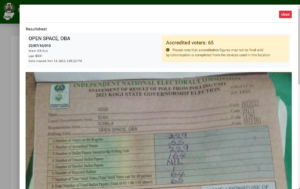
In another polling unit in Idah named Agric Farm Centre, the accredited voters are 31, which is the same as the accredited voters on the physical result sheet.
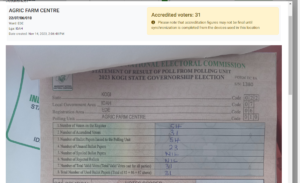
In a different local government in Okura-Olafia in the Dekina local government of the state, a polling unit, Open Space River Side, both the accredited voters on IReV and the physical result sheet all show 237.
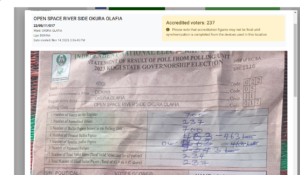
In Ofu local government, a polling unit, LGEA Pri Sch, Oladebu, the number accredited voters both on IReV and the physical result sheet aligned, which is 191.
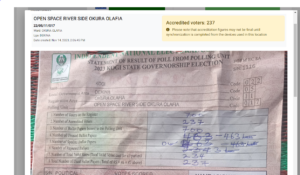
But a random check on IReV results of most of the local governments in Kogi Central where Usman Ododo, candidate of the All Progressives Congress (APC) and winner of the election hails from, the number of accredited voters on the portal and those on the physical results never align.
Kogi Central has five local governments – Okene, Okehi, Adavi, Ajaokuta and Ogori Mangogo, majority of the results from the area posted on IReV showed over-voting. The All Progressives Congress (APC) candidate, Usman Ododo, is from Kogi Central.
A random check of results on IReV from Kogi Central revealed that accredited voters on physical results sheets to be at least three times bigger than the accredited voters on the portal.
For example, a polling unit named Near Obajimoh Compound in Adavi local government, accredited voters on the portal is 207 while accredited voters on the physical polling unit is 679.
In another polling unit, Sule Ozovoehe compound in Adavi, while the portal shows 93 accredited voters, the physical result has 304.
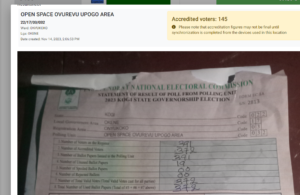
In a polling unit, Open Space, Ovurevu Upogo area of Okene local government, while the portal has 145 accredited voters, the physical polling unit result sheet shows 372.
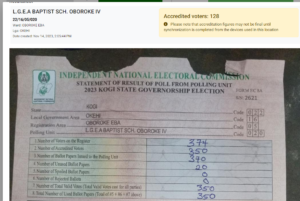
In a polling unit, LGEA Baptist School, Oboroke in Okehi local government, while the accredited voters on IReV portal show 128, those on the physical result sheet is 350.
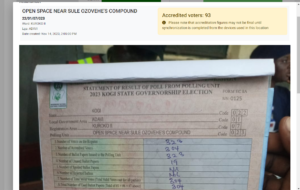








More Stories
Teenager in viral photo of Obi’s 2023 presidential campaign rally, Alabi Quadri languishes in jail
Ribadu tells families of kidnapped victims not to pay any ransom
Ozigbo rejects Anambra APC guber primary, calls it a theft